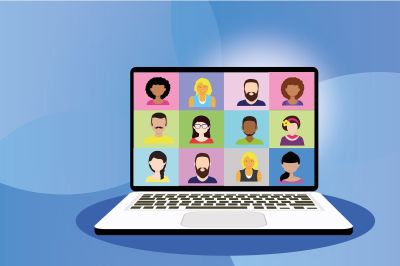CORE Questions - An Overview
CORE questions provide an effective method for identifying the core of a challenge, deriving effective solutions, and solidifying an outcome with a positively charged sense of goal achievement. The acronym "CORE" stands for Challenge, Outcome, Resources, and Effect. Each of these four steps should be undertaken in the CORE process.
CORE questions can support decision-making and are suitable both as an entry point for coaching or as a standalone process. When used as an entry point, moderating the CORE questions typically takes around 5 to 20 minutes, while when used as a standalone process, it can easily take 3 to 5x longer.
Using CORE Questions to reach the core problem
Core question: With which specific challenges do you struggle?
At the core of personal and professional growth lies the recognition of your challenges. Identifying and understanding the hurdles that stand in your way is the first step towards overcoming them. By clarifying the specific challenges you encounter, you gain a better understanding of what you need to conquer or navigate around in order to achieve your desired outcomes.
 Finding the key challenge to tackle.
Finding the key challenge to tackle.
For example, a challenge could be completing a complex project within a tight deadline or your (emotional) reaction towards certain feedback. Whatever it is - name it.
Identifying the desired outcome using CORE Questions
Core question: What do you aim to achieve?
Once you have recognized the challenges, it's crucial to define your desired outcomes. The Outcome question encourages you to envision the result you aim to achieve. This step involves setting clear and measurable goals that align with your values and aspirations. By picturing your desired outcomes, you create a roadmap that guides your actions and motivates you to stay focused and committed. Objectives allow you to measure your progress and adjust your actions along the way.
 Visualize the desired result.
Visualize the desired result.
For instance, an outcome could be a promotion to a leadership role within the next year or to react calmly upon receiving (negative) feedback.
Using CORE Questions to activate emotional resources
Core question: What tools, skills or emotional sources of power can aid you in overcoming challenges and attaining your desired outcomes?
Having a clear understanding of the resources at your disposal is pivotal for implementation progress. The Resources question prompts you to identify the tools, skills and emotional sources of power that can aid you in overcoming challenges and attaining your desired outcomes. Resources can come in various forms, such as your personal strengths, relationships, financial means or emotions. Recognizing and leveraging these resources empowers you to make informed decisions and seek help when needed. Additionally, it allows you to identify any gaps or limitations in your resources, prompting you to explore avenues for growth and development.
 Identifying desired resources.
Identifying desired resources.
A powerful resource is often a suitable mentor. As this person already went through your struggles successfully he or she has gained knowledge and skills that you can benefit from.
CORE Questions help you understand the positive effects of taking action
Core question: What is the impact of your actions and decisions, and how can you learn and adapt from it?
The final piece of the CORE framework is the Effect question - what will be possible for you when you achieve your desired outcome? Understanding the consequences of your efforts is crucial for making change happen. The Effect question encourages you to consider the personal impact of your actions as well as the impact on others in your environment.
 Exploring the effect.
Exploring the effect.
For instance, evaluating the effect of your new leadership role could lead to positive or negative emotions in you, which can help you guide through your decision making process. If you imagine your calm reaction upon receiving feedback from your manager, this alone can help you turn this image into reality.
Summary:
The CORE questions—Challenge, Outcome, Resources, and Effect—provide you with a comprehensive framework for personal and professional growth. By consciously engaging with each question, you gain clarity, define your objectives, mobilize your resources, and evaluate the impact of your actions. This systematic approach empowers you to generate and achieve your aspirations.

Whether you're embarking on a new project, pursuing a career change, or seeking to improve your emotional and mental health, the CORE questions serve as your guiding light, helping you navigate and providing valuable structure.
You can use the CORE questions anytime for yourself in order to work on your topics. If you want to have support during the process or wish to integrate an external perspective from the beginning, feel free to send me an e-mail or get in touch via contact form.
More articles
by Antoni

How to reach your goals with CORE Questions
When it comes to personal and professional development, the CORE questions have emerged as a powerful tool for self-reflection and goal-setting. These four fundamental inquiries—Challenge, Outcome, Resources, and Effect—provide you with a systematic approach to show you the way from problem focus to goal focus.
By delving into each aspect, you can gain more clarity, define your objectives, mobilize your resources, and evaluate the impact of your actions. In this blog post, we will explore the significance of the CORE questions and how they can guide you towards accomplishing your aspirations.
by admin

Questioning Techniques: How to use SPIN Questions
Questioning techniques are an essential element in my coaching kit. Today I am therefore starting the ABC of Questioning Techniques, in which further questioning techniques will follow in the coming weeks. Let's start with the SPIN questions - SPIN stands for situation questions, problem questions, implication questions and benefit questions. In this blog post you will find out where SPIN can help you and how it works in a sales meeting with a client.
Read more … Questioning Techniques: How to use SPIN Questions
by admin

How to solve team conflicts in seven steps
I often come across ongoing conflicts in teams of all kinds. And while a certain amount of conflict in the team can contribute to the achievement of goals, some conflicts develop in a destructive direction. Both openly acted out conflicts as well as hidden and subliminal conflicts then inhibit cooperation and thus also the quality of results in day-to-day business or in projects. In this blog article, I explain my method for effectively resolving conflicts in the team.
by admin

What we can learn about ourselves from moral licensing
Today we are talking about the psychological phenomenon of moral licensing. In the following, you will learn what it is all about and how I assess the different types.
Read more … What we can learn about ourselves from moral licensing
by admin

Question Storming - how the method works best
Today's blog article is about Question Storming - one of my favorite methods in workshops. Unfortunately, the method is often used incorrectly and thus does not reach its full potential. In this article you can read how you can do it better in your organization and your team.
by admin

Leadership live webinar
Today I'd like to introduce you to my regular live webinar for people in leadership positions on the topic of " solving problems effectively". In this article you can find out what the webinar is about, what's the added value for your, why I'm holding it live and how you can register.
by admin

Four approaches to a happy life
Today we are dealing with a classic question that many well-intentioned and poorly made guidebooks unfortunately come up with. The question of our own satisfaction and how we can best achieve and maintain a "happy state". Here we go...
by admin

How a Coaching in India broadens your horizon
Today I share my latest international coaching project with you.
20 coaching sessions with different people from India. In this article I will share my thoughts on why I highly recommend everyone to get exposed to a completely different environment than the one you are used to, both privately and professionally.
by admin

How to solve problems with perspective changes
Today let's take a look at a popular tool that you can expect to find in every good coaching toolbox - change of perspective. I will go into what the change of perspective is all about, how you can make the best use it for yourself and how a "cerebral cinema" for two practical examples looks like.
by admin

Successful investments using the mountain metaphor
Today we are talking about investing money in the stock market. And specifically about the emotional challenges of investing money. This aspect is often underestimated - which is why this article teaches you what shouldn't happen to you and your investments on the stock market. Of course, this is not investment advice, but only my personal opinion as a private investor and coach.
Read more … Successful investments using the mountain metaphor
by admin

How we can learn to make the best decisions
We make several thousand decisions a day - which is quite a lot, in fact. We make most of them without any significant cognitive effort, virtually automatically. Other decisions are the result of thorough analysis and thoughtful evaluations. And sometimes we postpone decisions to infinity. In this blog post you can find about out what we can learn from our decision-making styles and you'll find some specific examples from the world of professional sports (Golf and football/soccer)...
